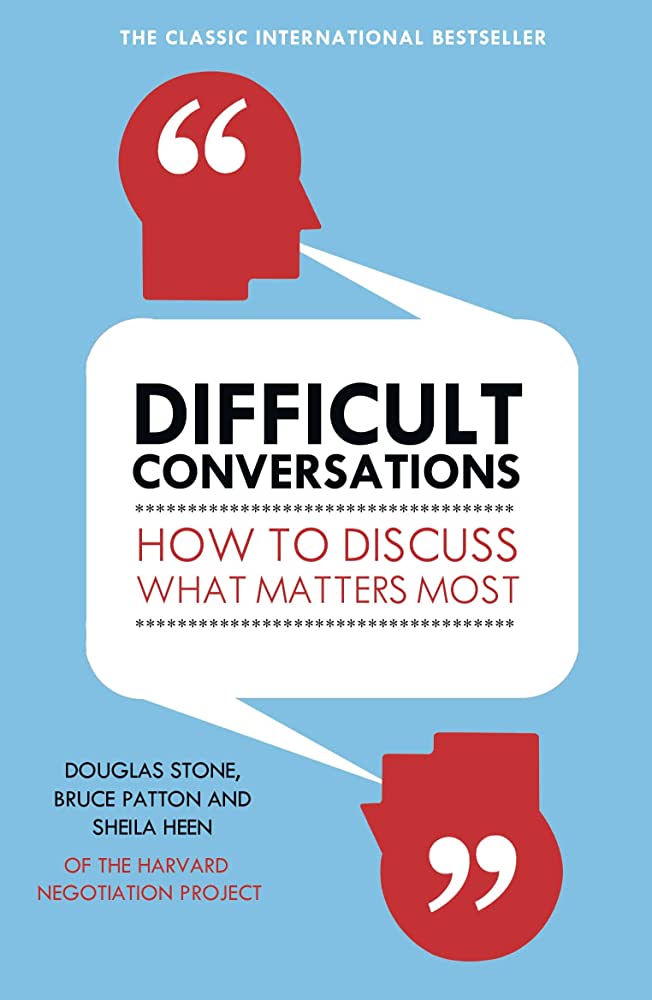Why feelings need to be heard before we try to solve problems

We have a lot of difficult conversations in animal welfare.
All day, every day we navigate strong feelings (our own and others') about the stressful and distressing situations we encounter that literally may be about life and death.
And, as usual, most of us never receive any training on having these kinds of conversations in a constructive, respectful way.
In my last blog I shared that when I was at Animal Care Expo last month, lots of you expressed your concerns about how to support staff around the euthanasia decision-making process.
How do we make room for staff to share dissenting opinions without greenlighting disrespectful behavior toward the individuals tasked with making those decisions?
And that's where the inspiration for our next book highlight comes from...
This month we have an excerpt from Difficult Conversations: How to Discuss What Matters Most by Douglas Stone, Bruce Patton, and Sheila Heen
“It is a fundamental rule: feelings crave acknowledgment…Unless they get the acknowledgment they need, feelings will cause trouble in the conversation - like a kid desperate for attention, positive or negative. If you provide that acknowledgment, you give the other person and the relationship something quite precious, something, perhaps, that they can only get from you.
Why is acknowledgment so important? Because attached to each expression of feelings is a set of invisible questions: "Are my feelings okay?” “Do you understand them?” “Do you care about them” “Do you care about me?”
These questions are important, and we have trouble moving on in the conversation until we know the answers. Taking time to acknowledge the other person's feelings says loud and clear that the answer to each question is yes.
An acknowledgment is simply any indication that you are struggling to understand the emotional content of what the other person is saying…There's no one perfect thing to say, in fact, you may not need to say anything. Sometimes you can acknowledge the other person with a simple nod, or even by the look in your eyes.
Ultimately, of course, people want their problems addressed. Questions like “What are we going to do about this?” “Why did you do what you did?” “How do you explain what happened?” are important. But order matters. Whether they say it or not, often people need some acknowledgment of feelings before they can move on…
Too often in difficult conversations and with the best of intentions, we skip right to the problem-solving without acknowledging, and the loss is significant.
Too often we assume that we either have to agree or disagree with the other person. In fact, we can acknowledge the power and importance of the feelings, while disagreeing with the substance of what is being said.
You can't move the conversation in a more positive direction until the other person feels heard and understood. And they won't feel heard and understood until you've listened. When the other person becomes highly emotional, listen and acknowledge…
Whenever you feel overwhelmed or unsure how to proceed, remember that it is always a good time to listen.”
For me, this passage is helpful because it reminds me that:
We have to acknowledge and address feelings at work if we want to solve some of our most entrenched problems.
Folks who work in animal sheltering live with a backlog of pain, sadness, anger, grief, etc. and those feelings leak out in the form of harmful behaviors:
Drama, judgment, rigid thinking, blaming, shaming, gossip, triangulation, and emotional reactivity (those leaks can become explosions!).
Learning how to have more productive, respectful conversations about euthanasia and other difficult parts of our work means taking time to acknowledge feelings (ours and others) and learning how to practice emotional regulation so that we can express ourselves respectfully.
Listening and acknowledging feelings takes time and can be uncomfortable. Which is why we don’t do it (and why we struggle with this issue decade after decade in animal sheltering).
But we need to make the time, if we want real solutions.
As Brene Brown said: “Leaders must either invest a reasonable amount of time attending to fears and feelings, or squander an unreasonable amount of time trying to manage ineffective and unproductive behavior.”
This is a helpful book with lots of concrete tips. You can find a copy here.

Let's Stay Connected.
Sign up for ideas, updates, and your free copy of The ABCs of Self Care Workbook!
I heart boundaries and will never sell your email address. Unsubscribe at any time.

